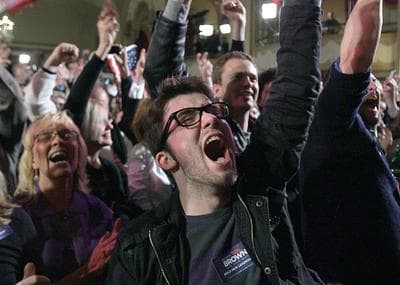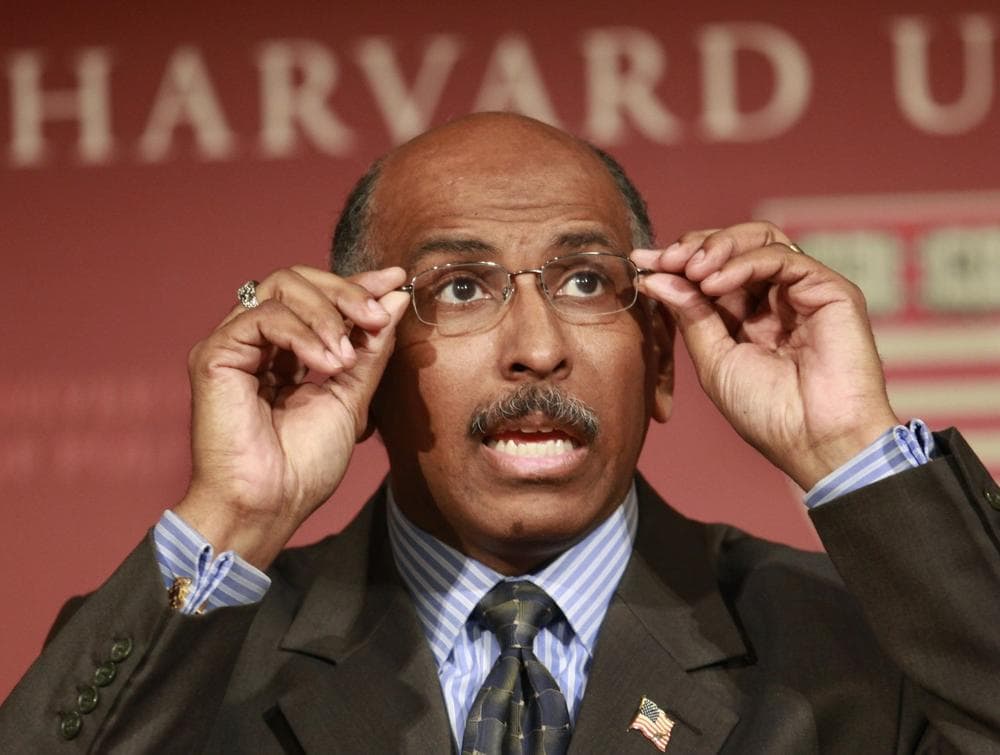Advertisement
Mass. Republicans Eager To Follow In Brown's Footsteps
Resume
This could be the year for Republicans in Massachusetts.
"For the first time in a long time, we can say that the wind appears as though it's going to be at our back, and not something that we're fighting through," says Nick Connors, executive director of the Massachusetts Republican Party.
But go to a local Republican gathering, and it feels like the doldrums. State committee member Sheila Richardson is one of only 18 people sitting at tables, sipping coffee and beer. The meeting is all about Scott Brown.
"The interest in that campaign was something I've never seen," Richardson says. People were coming into Brown's campaign office in Littleton in droves, she says, "saying give me a sign, give me a bumper sticker, give me anything."
Even at this poorly attended meeting, hopeful candidates come through, eager to make their pitch to party insiders.
“For the first time in a long time, we can say that the wind appears as though it’s going to be at our back, and not something that we’re fighting through."
--Nick Connors, executive director, Massachusetts Republican Party
Everybody wants to be Scott Brown these days. But here's the obstacle for Republicans: Only one in eight Massachusetts voters is a registered Republican. Republican candidates can't win without independent voters and a large part of union households.
Republicans are most energized in challenging Democratic Rep. Bill Delahunt of Quincy. Brown carried Delahunt's district by a bigger margin than any other. Now, six Republicans are thinking of running.
One of them is state Sen. Bob Hedlund of Weymouth. At a Republican breakfast at the Monponsett Inn, in Halifax, Hedlund points out that his town gave Brown his biggest margin in the state — nearly 7,000 votes.
"I've been someone that has brought some non-traditional Republican constituencies into the mix," Hedlund says. "I've had a pretty good record with labor."
Weymouth is home to the highest percentage of union households in Massachusetts, and union families ended up being instrumental in Brown's victory. Hedlund argues that union workers are one important ingredient for a repeat Republican victory this fall.
Internal polling by the AFL-CIO revealed that 49 percent of their own members voted for Brown, Hedlund says. And that's no small thing when you're evaluating Democrats' chances to hang on to power.
Andy Smith, director of the University of New Hampshire Survey Center, agrees with Hedlund that the union vote is up for grabs this year. "These are people who have traditionally been in the Democratic Party," says Smith, who polls regularly in Massachusetts.

"If you think of the Democratic Party in Massachusetts, it's like two parties," he explains. "You've got the Cambridge Faculty Club party, then you've got maybe like the South Boston or the Worcester union hall party. Democrats win when they can unify those two wings of the party. Republicans can make serious inroads into that blue-collar wing of the Democratic Party, they've got a good chance of winning."
And that chance improves if Republicans can continue to excite independent voters.
John Marshall is one of those voters. "It's absolutely a resurgence of the people getting involved," Marshall says, standing outside the Falmouth Inn in a crowd of people waiting to meet the senator-elect. "And now that we see that we can actually make a difference, this is going to carry right across the country."
What about Massachusetts? "Well, I see the gubernatorial race that's coming up," Marshall says. "I see Deval Patrick's gonna be — I think he'll be out and I think somebody like Tim Cahill."
Tim Cahill. The problem is, he is not a Republican. He was a Democrat, and now he's running as an independent against Patrick. So Brown's victory does not guarantee a Republicans win in the governor's race, but what about Congress?
"I've been thinkin' about Bill Delahunt," Marshall says, laughing. "I don't think anybody's safe in this climate."
Democrats, consider yourselves warned.
This program aired on February 4, 2010.
